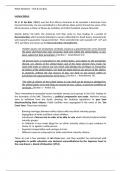Week Nineteen – W.E.B. Du Bois
Lecture Notes:
W. E. B. Du Bois [1868-] was the first African American to be awarded a doctorate from
Harvard University. He was committed to a Pan-African ideal, and in the last few years of his
life he became a citizen of Ghana by invitation of its first President, Kwame Nkrumah.
Shortly before his birth, the American Civil War came to end, leading to a period of
Reconstruction which involved attempts to secure citizenship for freed slaves. Amendments
were passed to guarantee ‘equal protection’. Three amendments were passed [13 th, 14th and
15th] and these are known as the Reconstruction Amendments:
‘Neither slavery nor involuntary servitude, except as a punishment for crime whereof
the party shall have been duly convicted, shall exist within the United States, or any
place subject tot their jurisdiction’. [Section I – Amendment 13]
‘All persons born or naturalised in the United States, and subject to the jurisdiction
thereof, are citizens of the United States and of the State wherein they reside. No
state shall make or enforce any law which shall abridge the privileges or immunities
of citizens of the United States; nor shall any State deprive any person of life, liberty,
or property, without the due process of law; nor deny to any person within its
jurisdiction the equal protection of the laws’. [Section 1 – Amendment 14].
‘The right of citizens of the United States to vote shall not be denied or abridged by
the United States or by and State on account of race, colour, or previous condition of
servitude’. [Section 1 – Article 15].
These Amendments prompted severe backlash among racist groups in the USA, leading to
the formation of the KKK. Therefore, a political compromise was made. Northern troops
were to withdraw from the South, allowing the Southern legislatures to pass laws
disenfranchising black citizens. Public facilities were segregated in the name of the ‘Jim
Crow’ laws. These laws included:
- Banning marriages between white citizens with any ethnic minority groups.
- Segregation of white and black school children .
- Introduced a literacy test in order to be able to vote which directly hindered ethnic
minority groups.
- In California it was made illegal for an ethnic minority citizen to give evidence in
favour of, or against a white person.
- Separate transportation and carriages in train.
- Different rooms in restaurants for white and ethnic minority citizens.
These are just a few examples of Jim Crow laws, and they wouldn’t be overturned until
segregation in public education was declared unconstitutional by the Supreme Court in
the case Brown v. Board of Education [1954].
, Week Nineteen – W.E.B. Du Bois
Most of Du Bois’ worked centred around race, and a key component of his account was the
issue of double consciousness which he said was a direct effect of prejudice and racism.
According to Du Bois, prejudice and racism has a psychological impact on the lives and
prospects of black Americans:
‘the Negro is a sort of seventh son, born with a veil, and gifted with second-sight in
this American world, - a world which yields him not true self-consciousness, but only
lets him see himself through the revelation of the other world. It is a peculiar
sensation, this double-consciousness, this sense of always looking at oneself
through the eyes of others, of measuring one’s soul by the tape of a world that
looks on in amused contempt and pity’. [The Souls of Black Folk: Chapter 1].
When a society starts to mark out a certain group and their characteristics as inferior, this
has an effect on the group which sees them perceive or think of themselves in ways of
prejudice. People begin to identify themselves on the basis of prejudice and see their
qualities and attributes as inferior and something to be ashamed of. This sees the prejudiced
assumptions of others become superior over your own internal experience, and this is
double consciousness.
Du Bois said that double consciousness is a form of alienation as Black Americans became
alienated from their authentic selves and their culture. They saw themselves in the eyes of
their oppressor, instead of through their own experiences: ‘He must be himself, not
another’. [The Souls of Black Folk: Chapter 1]. This is similar to how Marx viewed the
proletariat as alienated from their true existence and humanity.
Booker T. Washington [1856-1915] was a leading African American thinker and politician
during the time Du Bois wrote his famous ‘Souls of Black Folk’.
Washington advocated policies of self-help: addressing black disadvantage through efforts
coordinated within the black community to achieve economic advancement and
independence. In his ‘Atlanta Compromise’ speech of 1895, Washington suggested that
instead of directly challenging the Jim Crow laws, black Americans should prioritise their
education and entrepreneurship. Hard work, self-discipline and the creation of independent
black institutions was the answer, not protest or political agitation.
Du Bois, however, disagreed with this and said that the programme ‘practically accepts the
alleged inferiority of the Negro races’ [The Souls of Black Folk: Chapter 3]. Gaining self-
respect entails gaining political equality, and this requires some form of political struggle
and demand. So long as black citizens do not have the same rights and have an inferior
status, they will suffer from double consciousness.
To overcome racial subordination, black Americans would need to come together and be in
solidarity with one another. All the subsections in black society would need to come
together: working-class citizens, middle-class citizens, educated citizens, unemployed
citizens and Southern citizens). Furthermore, there should be an intersection among class-
based, gender-based and sexuality lines. Solidary among all these groups and lines is




